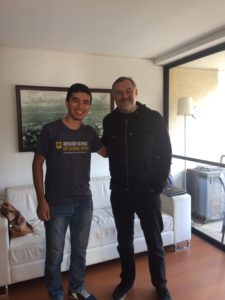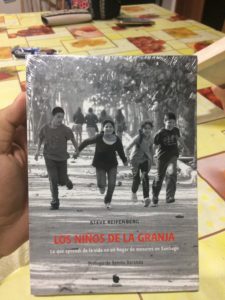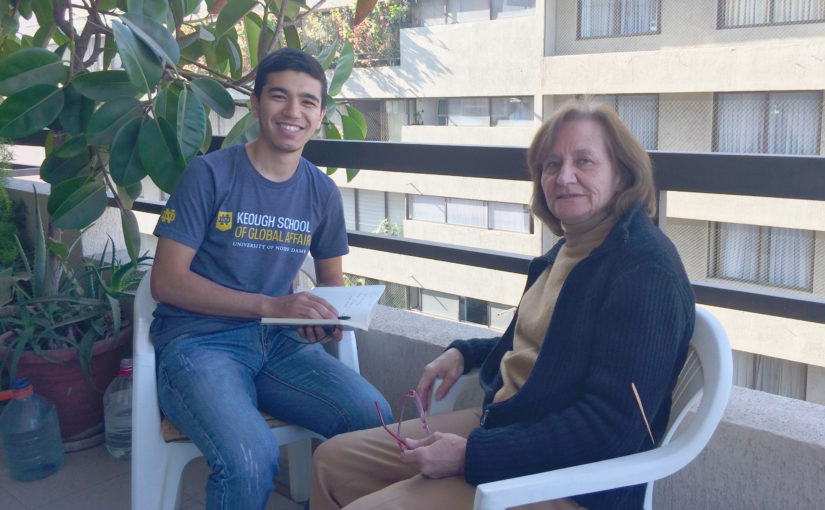After the second semester ended with lots of sentimental hugs and long-lasting goodbyes, I found myself immediately packing for travel to the capital of a long and narrow, yet incredibly beautiful country in South America: Chile. As a part of the Integration Lab (i-Lab), with my teammates Sonia and Nnadozie, I am working with Enseña Chile (eCh) to help implement their project “Colegios que Aprenden” (Schools that Learn). Two weeks before the start of our project, I am in Santiago to make final preparations for our field work and practice my Spanish.
ABOUT OUR GLOBAL PARTNER
Enseña Chile is an NGO that aims to prepare children for a meaningful future by providing quality educational opportunities for all students in Chile. They recruit talented teachers, based on merit and leadership, to work in schools across Chile. Their work reflects a commitment that all children in Chile, including those in low-income schools, have the ability to learn and the right to receive a quality education. A new business model, “Colegios que Aprenden”, which they established last year, assists teachers to improve their professional expertise, foster community and school-wide innovation, and enhance student learning.
Using Design Thinking, our Master of Global Affairs team will engage in classroom observations, interviews with school leaders, teachers and students, and a series of collaborative focus groups, and will develop a set of recommendations and prototypes to be deployed in Chilean schools. We are hopeful and excited that our two months in the field and further engagement with the organization will bear a result that is of a value for the children in Chile and beyond.
WHAT I’VE LEARNED ABOUT CHILEAN SPANISH
Our project involves interviews and focus groups where the primary language of communication is Spanish. That’s why I’ve come to Chile early to take intensive  Spanish classes—my first exposure to Spanish! While the rest of my classmates are enjoying a three-week post-semester holiday, I am enjoying my Spanish classes and my busy, yet never the same, schedule in Chile. My host tells me Chilean Spanish is the fastest and most complicated of Spanish accents in the world: my daily conversations with my host almost always challenge my textbook Spanish knowledge. I am hopeful my current hardship will turn me into a “seco”, meaning “skillful” in Chilean Spanish, in understanding any other Spanish accents.
Spanish classes—my first exposure to Spanish! While the rest of my classmates are enjoying a three-week post-semester holiday, I am enjoying my Spanish classes and my busy, yet never the same, schedule in Chile. My host tells me Chilean Spanish is the fastest and most complicated of Spanish accents in the world: my daily conversations with my host almost always challenge my textbook Spanish knowledge. I am hopeful my current hardship will turn me into a “seco”, meaning “skillful” in Chilean Spanish, in understanding any other Spanish accents.
MY FIRST MEETINGS
On Friday I visited the office of eCh in Santiago and had a meeting with Trinidad Montes, our coordinator at eCh. The meeting was very interesting and useful as Sonia joined through Skype to talk about the organizational and substantive aspects of our project. Trinidad introduced me to the incredibly inspiring eCh staff. The work was at its peak and teams were enthusiastically collaborating with each other. I was fortunate to meet Tomas Recart, the CEO of eCh and a dedicated educator whom I had only known through YouTube videos. His words of trust and excitement towards our team and the work we will be conducting instilled in me further motivation and passion. Meeting Tomas Vergara, our i-Lab liaison in Chile, who visited Notre Dame in March and worked with us in co-creating our project, was also a particular pleasure.
A PLACE I’VE COME TO LOVE
My busy schedule in Santiago still leaves enough time to visit Domingo Savio, the place I have come to love through the book Santiago’s Children, by my Keough School i-Lab Professor Steve Reifenberg. The house was previously a private orphanage, and is now being used as an educational center for kids. It is situated in one of poor neighborhoods in Santiago.
 In Santiago’s Children, Professor Reifenberg talks about his experience working for Domingo Savio in the 1980s when he visited Chile right after the college, not knowing Spanish well. The stories described in the book are so authentic that they bring you into author’s life 35 years ago and make you see it from his eyes. How would you feel if you visited the place and the people you imagine of, having only read about it in the book? I felt very emotional and ecstatic after meeting Olga, who opened her home for orphans and children of low-income families. I found so much love and care in her eyes. In the meantime, Jorge, a teacher at Domingo Savio, showed me around and narrated the history of the place and how it looked before. As he described the way the rooms were divided and turned into bedrooms and living rooms for children, I would nod my head every time, subtly signaling that I knew about it.
In Santiago’s Children, Professor Reifenberg talks about his experience working for Domingo Savio in the 1980s when he visited Chile right after the college, not knowing Spanish well. The stories described in the book are so authentic that they bring you into author’s life 35 years ago and make you see it from his eyes. How would you feel if you visited the place and the people you imagine of, having only read about it in the book? I felt very emotional and ecstatic after meeting Olga, who opened her home for orphans and children of low-income families. I found so much love and care in her eyes. In the meantime, Jorge, a teacher at Domingo Savio, showed me around and narrated the history of the place and how it looked before. As he described the way the rooms were divided and turned into bedrooms and living rooms for children, I would nod my head every time, subtly signaling that I knew about it.
All in all, this is just my first week in Santiago, but the city has already managed to capture my love and respect for its people.

